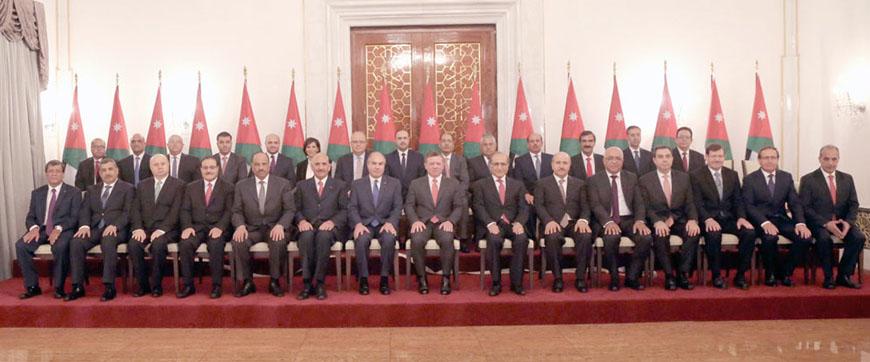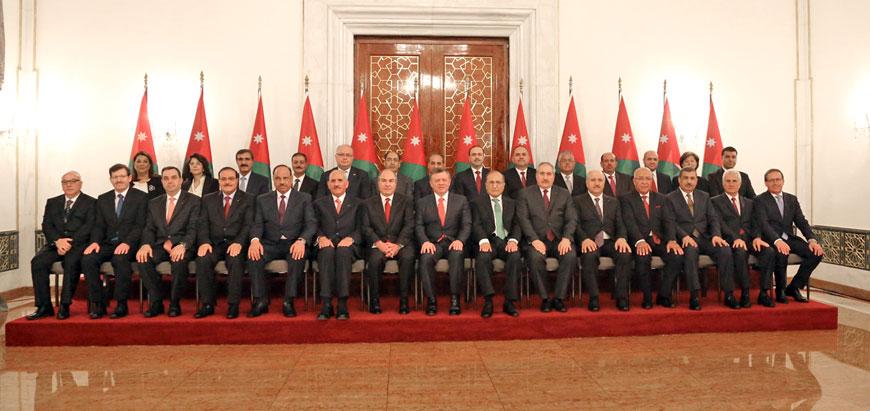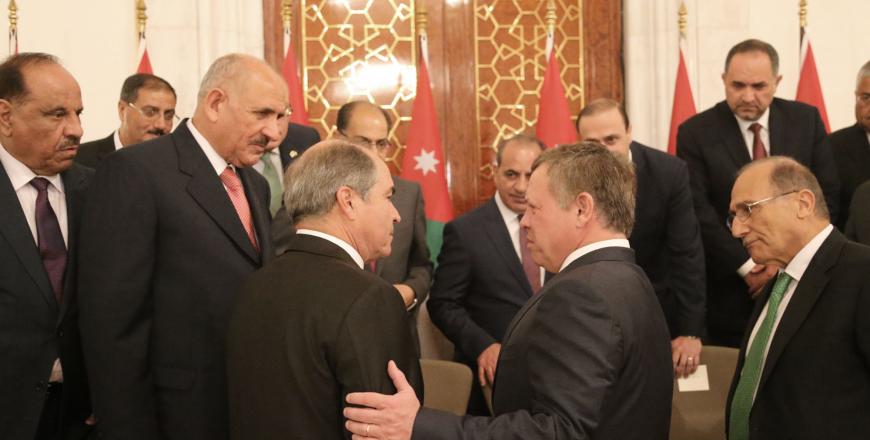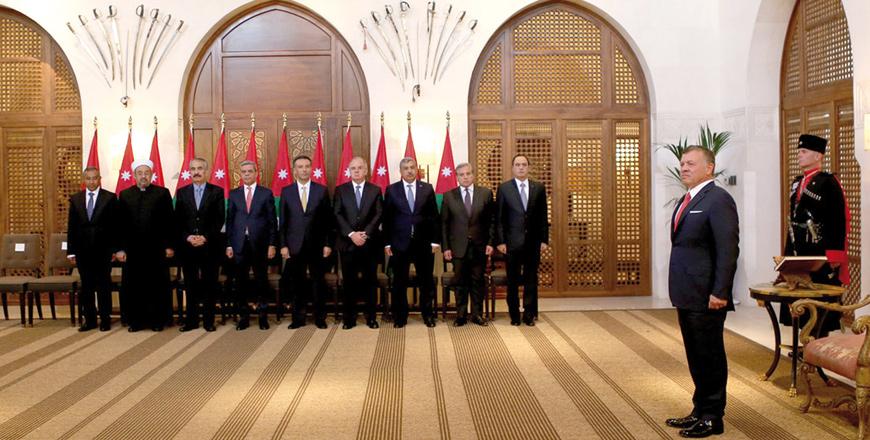You are here
Mulki’s new government sworn in
By Omar Obeidat - Sep 29,2016 - Last updated at Sep 29,2016

His Majesty King Abdullah with members of Prime Minister Hani Mulki’s new Cabinet on Wednesday (Photo courtesy of Royal Court)
AMMAN — Prime Minister Hani Mulki and members of his new Cabinet were sworn in on Wednesday before His Majesty King Abdullah.
Besides Mulki, who was designated by King Abdullah on Sunday to form a new government, the Cabinet consists of 29 ministers.
Mulki formed his first government on June 1.
The premier kept three deputy prime ministers from the previous government but the portfolio of Jawad Anani, who was deputy prime minister for economic affairs and minister of industry, trade and supply, changed to deputy prime minister for economic affairs and minister of state for investment affairs.
This is the first time the government appoints a minister to be in charge of the investment sector.
Mohammad Thneibat, deputy prime minister for services and minister of education, and Nasser Judeh, deputy prime minister and minister of foreign affairs, kept their portfolios.
Twenty-two ministers from the previous government remained, while six others were not included in the new Cabinet, and seven new ministers were introduced, among them are five first-timers. (See profiles of new ministers)
The ministers who left the government are: former minister of higher education and scientific research Wajih Owais, former minister of transport Yahya Kisbi, former minister of justice Bassam Talhouni, former agriculture minister Rida Khawaldeh, former public sector development minister Yasera Ghosheh and former social development minister Khawla Armouti.
Owais, Talhouni, Khawaldeh and Ghosheh were appointed as senators on Tuesday.
The seven new ministers appointed Wednesday include Culture Minister Nabih Shuqum and Social Development Minister Wajih Azaizeh, who held these portfolios in previous governments, in addition to the five first-time Cabinet members: Yusuf Mansur (minister of state for economic affairs), Bisher Khasawneh (minister of state for foreign affairs), Yarub Qudah (minister of industry, trade and supply), Awad Mashagbeh (minister of justice) and Malek Haddad (minister of transport).
Two ministers have remained but have been given other portfolios — Adel Tweisi moved from the culture ministry to the ministry of higher education and scientific research, while Khaled Hneifat who was minister of state will now be in charge of the agriculture portfolio.
The government includes two women ministers only, down from four, which outraged women activists.
Three new portfolios were introduced in the new government: ministry of state for investment affairs, ministry of state for economic affairs and ministry of state for foreign affairs.
ICT Minister Majd Shweikeh was also tasked with the portfolio of public sector development.
Cabinet list
Following is the list of Prime Minister Hani Mulki’s Cabinet members:
- Hani Mulki: Prime Minister and Minister of Defence
- Jawad Anani: Deputy Prime Minister for Economic Affairs and Minister of State for Investment Affairs
- Mohammad Thneibat: Deputy Prime Minister for Services and Minister of Education
- Nasser Judeh: Deputy Prime Minister and Minister of Foreign and Expatriate Affairs
- Salameh Hammad: Minister of Interior
- Hazem Nasser: Minister of Water and Irrigation
- Adel Tweisi: Minister of Higher Education and Scientific Research
- Musa Maaytah: Minister of Political and Parliamentary Affairs and Minister of State
- Nabih Shuqum: Minister of Culture
- Imad Fakhoury: Minister of Planning and International Cooperation
- Ali Ghezawi: Minister of Labour
- Mahmoud Sheyyab: Minister of Health
- Wajih Azaizeh: Minister of Social Development
- Yaseen Khayyat: Minister of Environment
- Walid Masri: Minister of Municipal Affairs
- Ibrahim Saif: Minister of Energy and Mineral Resources
- Mohammad Momani: Minister of State for Media Affairs
- Sami Halaseh: Minister of Public Works and Housing
- Majd Shweikeh: Minister of ICT and Minister of Public Sector Development
- Omar Malhas: Minister of Finance
- Rami Wreikat: Minister of Youth
- Fawaz Irshaidat: Minister of State for Prime Ministry Affairs
- Wael Arabiyat: Minister of Awqaf and Islamic Affairs
- Lina Annab: Minister of Tourism and Antiquities
- Khaled Hneifat: Minister of Agriculture
- Yusuf Mansur: Minister of State for Economic Affairs
- Bisher Khasawneh: Minister of State for Foreign Affairs
- Yarub Qudah: Minister of Industry, Trade and Supply
- Awad Mashagbeh: Minister of Justice
- Malek Haddad: Minister of Transport
Related Articles
AMMAN – Prime Minister Hani Mulki and his Cabinet were sworn in Wednesday before His Majesty King Abdullah. Besides Mulki, who succeede
AMMAN – Prime Minister Hani Mulki and his Cabinet were sworn in Wednesday before His Majesty King Abdullah. Besides Mulki, who succeede
AMMAN — A Royal Decree was issued on Sunday approving a reshuffle in Prime Minister Hani Mulki’s government.The shakeup, which came upon the



















